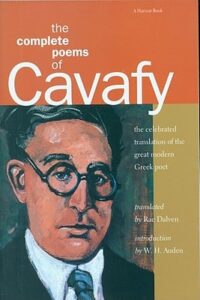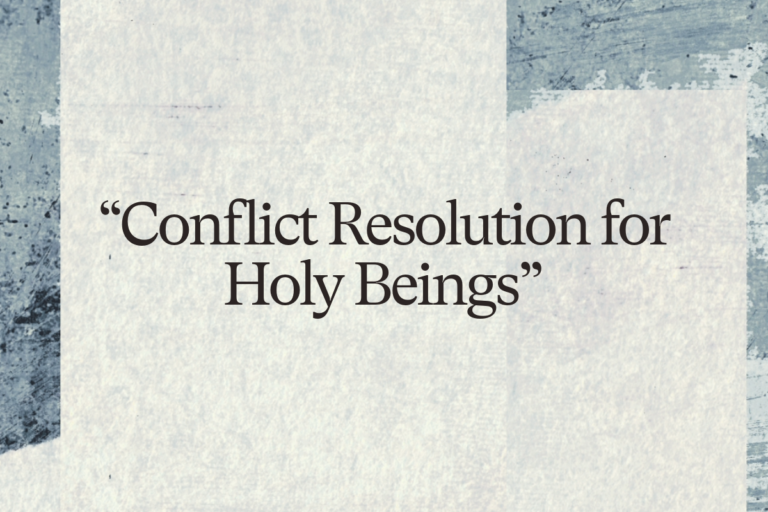Constantine P. Cavafy
Poems as Teachers | Episode 3
We ask questions to find out the facts, but what if you can’t trust the answers, the questions, or the person who’s asking the questions? In Constantine P. Cavafy’s “Waiting for the Barbarians,” translated by Evan Jones, leaders exercise a sinister kind of violence — they’ve taken over people’s imaginations with showy displays of wealth and privilege, time-wasting ceremony, and fear coursing beneath it all.
This is the third episode of “Poems as Teachers,” a special seven-part miniseries on conflict and the human condition.
We’re pleased to offer Constantine P. Cavafy’s poem, and invite you to read Pádraig’s weekly Poetry Unbound Substack, read the Poetry Unbound book, or listen back to all our episodes.
Guests

Constantine P. Cavafy was a Greek-language poet born in Alexandria, Egypt, and he lived from 1863 to 1933. His poetry has been published in numerous collections, including The Complete Poems of Cavafy, The Collected Poems, and The Barbarians Arrive Today. Image © 2016-2018 Cavafy Archive, Onassis Foundation.

Evan Jones is a Greek-Canadian poet based in Manchester, England. His first collection, Nothing Fell Today But Rain, was a finalist for the Governor General's Literary Award for Poetry, and his British debut, Paralogues, was published in 2012. He is the translator of Constantine Cavafy’s The Barbarians Arrive Today: Poems & Prose, and his most recent poetry collection is Later Emperors.
Transcript
Transcription by Alletta Cooper
Pádraig Ó Tuama: My name is Pádraig Ó Tuama, and one of the things that I think can be very helpful that occurs in a poem sometimes — and it can also occur in good journalism — is to ask the question of: What else is happening? So to take a big event and to look at it, but then also to look under the surface. To look behind the curtain, to say, “Yeah, this has my attention, but what is it that is avoiding my attention that most needs it?”
[music: “Praise the Rain” by Gautam Srikishan]
“Waiting for the Barbarians” by Constantine Cavafy translated by Evan Jones
“– Why are we waiting in the agora?
“Because the barbarians arrive today.
“– Why is there such uncertainty in the Senate?
Why do the Senators sit there and not legislate?
“Because the barbarians arrive today.
What laws can our Senators enact now?
The barbarians will legislate when they arrive.
“– Why has our emperor awoken so early,
and seated himself before the city’s main gate,
on his throne, solemn, wearing his crown?
“Because the barbarians arrive today
and the emperor wants to greet
their leader. As is the custom, he will
present him with a parchment.
Many titles and names are written on it.
“– Why have our two consuls and the praetors chosen
today to don their red, embroidered togas?
Why are they wearing bracelets adorned with amethyst
and rings with shiny, glistening emeralds?
Why do they carry expensive walking sticks
gilded and inlaid with silver?
“Because the barbarians arrive today,
and such things impress barbarians.
“– And why have our outspoken orators not come as always
to spout their words, to have their say?
“Because the barbarians arrive today,
and eloquence and speeches bore them.
“– Where has this anxiousness and confusion come from
all of a sudden? Look at the haunted faces.
Why are the streets and squares emptying so rapidly
and everyone returning to their homes so worried?
“Because night fell and the barbarians never arrived.
Some men travelled to the border region,
and reported that the barbarians no longer exist.
——
“Now what will we do without the barbarians?
They were a sort of solution for us.”
[music: “Catching Water” by Gautam Srikishan]
So this is Constantine Cavafy’s best-known poem, or one of his best-known poems anyway — written in 1898, and then it became fairly popular in the early nineteen-hundreds. It’s set up as a dialogue between a questioner and someone who’s giving answers. And the respondent keeps on saying, “Because the barbarians arrive today.” They seem to know who the barbarians are and when they’re going to arrive. And this is repeated the whole way throughout the poem until it gets to the end, “because night fell and the barbarians never arrived.” And so this repeated refrain builds on certitude that the responder is offering, but then, also, something that changes as the poem evolves. One of the primary questions is, do I trust the person giving answers? I think that’s what Cavafy has left us with.
Constantine Cavafy was born in what was then Ottoman Egypt. And he wrote “Waiting for the Barbarians” when he was in his mid-thirties in 1898. During the period of his life he had to flee, he went to what was then named Constantinople, now Istanbul, in his late teens to escape a war. So his entire life was shaped, really, by shifts in empire, and colonization, and enmity, and treaties that were made, and then treaties that were broken as well.
Cavafy was often known to set poems in very specific times with historical markers, and he didn’t do that here. So, it’s kind of set in an every-time where there is this setup, but it isn’t referring to one specific emperor or one specific group of invaders or so-called invaders.
And so the poem, therefore, is a serious question as to what really is happening in the theater of war and the explanations that are put forward, as well as then in the performance and the pretense at certitude that commentators might offer. And that’s part of the entire theater you see the whole way throughout this brilliant poem.
[music: “Toothless Slope” by Blue Dot Sessions]
The repeated refrain of, “because the barbarians arrive today” seems to be used as an excuse for much that’s happening. One of the things to ask, therefore, is what else is happening? Obviously, there’s somebody asking questions and the questioner is able to observe a lot. The opening question, “Why are we waiting in the agora?” is just one line. And then the questions increase in observation but also anxiousness. “Where has this anxiousness and confusion come from all of a sudden?” maybe in the questioner as well as in the population.
Something that’s happening under the umbrella of the excuse of waiting for the barbarians is that there’s an enormous amount of pomp. You see the costume that the emperor and the senators are wearing, the consuls too. Why have they “chosen / today to don their red, embroidered togas?” Why did “they carry expensive walking sticks / gilded and inlaid with silver?”
The powerful are showing off their opulence, and why are they doing that? The people who are gathered in the meeting place of the city, it seems to remind them of their place, that they don’t have such opulence, that they are at the beck and call of the theater of deception that’s being set up by these people in power under the excuse that the barbarians are coming and that the barbarians don’t want the talk. They will want to be presented with lists and with parchments. But this is all untrue it seems because the barbarians aren’t coming. And, in fact, toward the end of the poem, we hear that the barbarians not only never arrived, but “that the barbarians no longer exist.” And so what you have is you’ve got performance from leadership, and then in the population you have growing anxiety. And even when they’re dismissed, they’re dismissed with anxiety wondering, when is this going to happen again? Not the barbarians coming, but, in a certain sense, the emperor and all the other ones with their opulence using these devices to cause unrest among the people.
[music: “Cirrus” by Blue Dot Sessions]
The word barbarian is an interesting one. It can be used to refer to anybody who doesn’t speak Greek. [laughs] That’s me. I’m a barbarian. Some people suggest that the etymology of it comes from “bar bar,” which is just a way of making noise to say people who speak foreign languages. I suppose lots of communities, lots of languages, have a word within their language to refer to somebody who doesn’t speak that very language — some word to refer to foreigners, some demeaning word. And the barbarians don’t exist. They’re invented by the leaders here as a distraction, and as a way to enhance some kind of agenda that means that they can show off their gold, and their togas, and their walking sticks, and their emeralds.
Underneath that is something more sinister which is: Look at how we can cause heightened anxiety, look at how we can take you away from your everyday work. Look at how we can take your attention to say, “Oh, it’s not on us. We’re waiting for these dreaded enemies.” The dreaded enemies don’t exist.
When you think about conflict and war, often, the imagination can go to grotesque injury and terrible violence, and that is true. That is one of the technologies that violence takes. Another technology is to try to embed fear in entire populations so that they can be controlled and that they can even get so caught up in the speculation among themselves — about what’s happening, what’s happening, what’s happening? — that they are distracted from uprising, that they’re distracted from asking for accountability, or demanding accountability. This is a violence of taking over the imagination of entire populations of people. And the point is for the people who are asking questions to say, “Here’s what I see, and this is a distraction.”
[music: “What Did You Not Hear” by Gautam Srikishan]
The final two lines of this poem are so intriguing. “Now what will we do without the barbarians? / They were a sort of solution for us.” “A sort of solution” in what way? And “a sort of solution” for who? Perhaps they were “a sort of solution” to not have to face how corrupt the leadership are. The leadership have gone to a lot of effort to maintain this theater of deception, but they’re also a way within which people don’t have to face: look at what we’ve been willing to put up with. Look at how long we’ve been willing to be deceived by people who are much more interested in the pantomime and the creation of an unrealistic fear for the purposes of group control. This is a solution that causes crisis, I think, from people to say, is this what we deserve? Is this what we want?
I find myself really confronted by this to ask myself, when have I been in this situation of creating deception? And when is it that I’m in the situation where I’m wondering what’s going on in front of me, and I haven’t been willing to believe my eyes? And I have been more interested in thinking, oh, there must be some kind of way within which I can understand if I can only get enough information. And Cavafy seems to be confronting me in this.
I think this is a poem that’s intelligent about conflict, and in one of the ways that it’s intelligent about conflict is that it creates conflict in me by saying, at what stage with the power I have, with the ease that I wish to maintain, or with the anxiety that I’m willing to tolerate for the purposes of some kind of order or pretense of order — the poem confronts me with asking, how long am I willing to put up with this? And what would I be willing to do in order to be part of a system that was different?
In the world of conflict, we often talk about conflict resolution. This isn’t a poem that’s trying to resolve conflict. In a certain sense, I think this is a poem that focuses and enhances conflict, hopefully, of a fruitful kind in order for the possibility of transformation locally.
[music: “Catching Water” by Gautam Srikishan]
“Waiting for the Barbarians” by Constantine Cavafy translated by Evan Jones
“– Why are we waiting in the agora?
“Because the barbarians arrive today.
“– Why is there such uncertainty in the Senate?
Why do the Senators sit there and not legislate?
“Because the barbarians arrive today.
What laws can our Senators enact now?
The barbarians will legislate when they arrive.
“– Why has our emperor awoken so early,
and seated himself before the city’s main gate,
on his throne, solemn, wearing his crown?
“Because the barbarians arrive today
and the emperor wants to greet
their leader. As is the custom, he will
present him with a parchment.
Many titles and names are written on it.
“– Why have our two consuls and the praetors chosen
today to don their red, embroidered togas?
Why are they wearing bracelets adorned with amethyst
and rings with shiny, glistening emeralds?
Why do they carry expensive walking sticks
gilded and inlaid with silver?
“Because the barbarians arrive today,
and such things impress barbarians.
“– And why have our outspoken orators not come as always
to spout their words, to have their say?
“Because the barbarians arrive today,
and eloquence and speeches bore them.
“– Where has this anxiousness and confusion come from
all of a sudden? Look at the haunted faces.
Why are the streets and squares emptying so rapidly
and everyone returning to their homes so worried?
“Because night fell and the barbarians never arrived.
Some men travelled to the border region,
and reported that the barbarians no longer exist.
——
“Now what will we do without the barbarians?
They were a sort of solution for us.”
[music: “Praise the Rain” by Gautam Srikishan]
Chris Heagle: “Waiting for the Barbarians” comes from Constantine Cavafy’s book The Barbarians Arrive Today. Thank you to Carcanet Press who gave us permission to use Constantine’s poem. Read it on our website at onbeing.org.
[music: “Praise the Rain” by Gautam Srikishan]
Additional support for this mini-season of Poetry Unbound comes from:
Civic (Re)Solve — building communities of civic empowerment.
Quiet — listen and finish listening.
And The Hearthland Foundation — committed to justice, equity and connection, one creative act at a time.
Poetry Unbound is: Gautam Srikishan, Eddie Gonzalez, Lucas Johnson, Kayla Edwards, Tiffany Champion, Cameron Musar, and me, Chris Heagle.
Our music is composed and provided by Gautam Srikishan and Blue Dot Sessions.
This podcast is produced by On Being Studios, which is located on Dakota land. Open your world to poetry with us by subscribing to our Substack newsletter. You may also enjoy Pádraig’s book, Poetry Unbound: Fifty Poems to Open Your World. For links and to find out more visit poetryunbound.org.
Books & Music
Recommended Reading
The On Being Project is an affiliate partner of Bookshop.org and Amazon.com. Any earnings we receive through these affiliate partnerships go into directly supporting The On Being Project.











